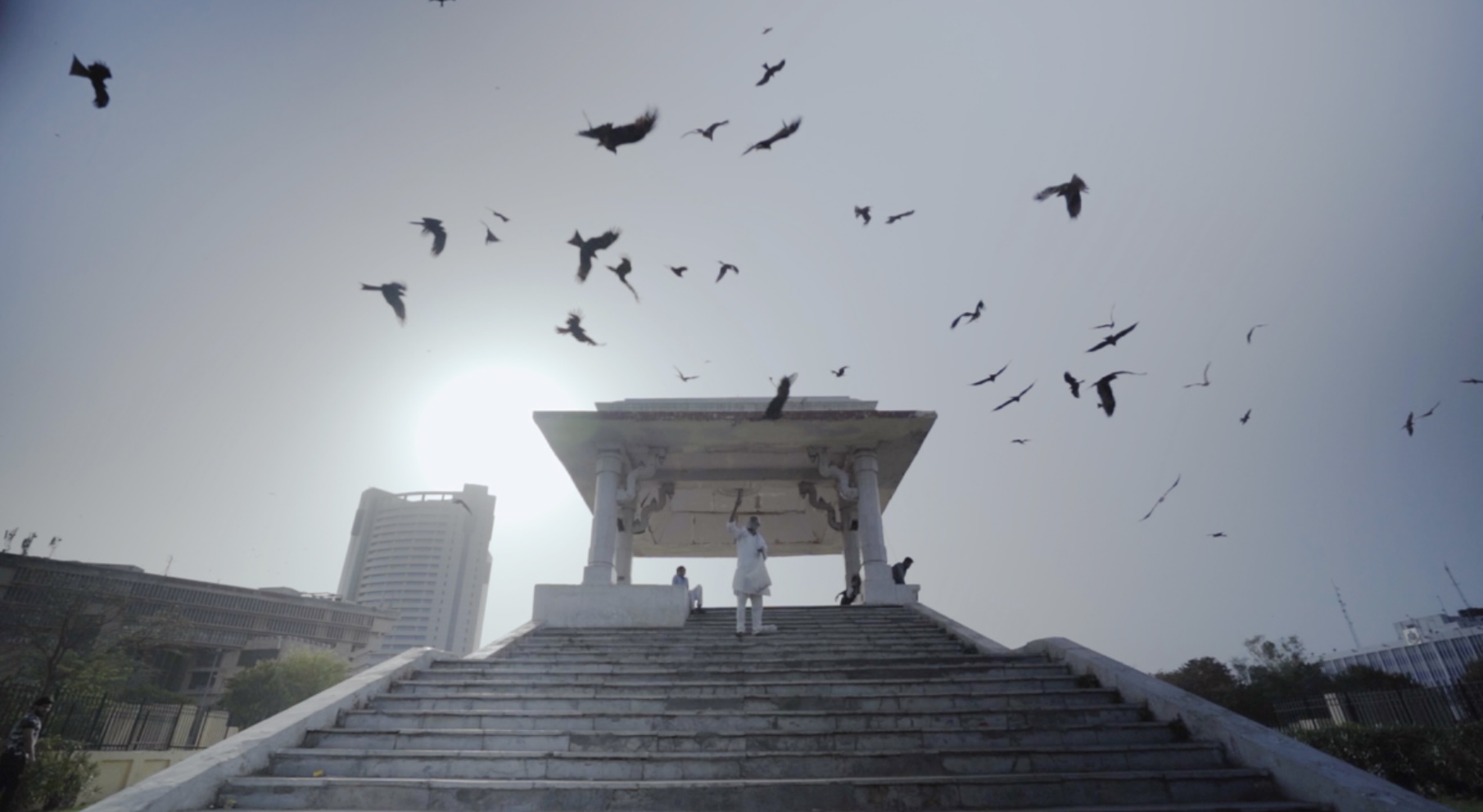t Diplomatic Courier, we’ve looked to the yearly Sundance Film Festival for guidance on how art depicts socioeconomic and political issues of a national and global importance. In that regard, the festival has never disappointed and this year promises to be an exceptional one. The event is often deemed an early predictor for movie trends, and it starts off the year with the best independent films the industry has to offer. Starting today and lasting until January 30th, this year festival is available online. While we’re excited for this year’s groundbreaking “New Frontier” projects and “Beyond Film” talks, we’re keeping our picks to full-length features.
Photo by Whitney DeVries.
Photo by Whitney DeVries.
KLONDIKE, Maryna Er Gorbach. World Cinema Dramatic Competition.

With “Klondike,” writer-director Maryna Er Gorbach depicts a couple’s uncertainty of life in the Donetsk region during the early days of the Donbas war in eastern Ukraine. The movie looks at expectant parents Irka and Tolik as they await the birth of their first child in this disruptive time. The growth of separatist groups in their community and the crash of flight MH17 further escalate the tensions in their village. “Klondike” brings us back to the crossroads of the Donbas conflict in 2014 as present tensions on the Ukrainian-Russian border escalate once again.
ALL THAT BREATHES, Shaunak Sen. World Cinema Documentary Competition.

Birds begin to fall from the polluted skies of New Delhi and two brothers take to caring for the injured black kites in Shaunak Sen’s “All That Breathes.” Social unrest breaks out in the urban backdrop of the film, affecting the brothers and the many other organisms coexisting in this space. “All That Breathes” focuses on this and the ultimate interconnectedness of the world’s ecosystem.
THE TERRITORY, Alex Pritz. World Cinema Documentary Competition.

The Indigenous Uru-eu-wau-wau people witness the increasing destruction of their rainforest territory, as shown in Alex Pritz’s film, “The Territory.” Logging, mining, and deforestation proliferate, exacerbated by Brazilian President Jair Bolsonaro and other far-right-wing politicians. With the government unwilling to stop rainforest devastation, the Uru-eu-wau-wau fight back, using media and technology to reveal the truth.
MARTE UM (MARS ONE), Gabriel Martins. World Cinema Dramatic Competition.

“Marte Um (Mars One)” follows a family living in Brazil as they witness their new reality following the election of a far-right extremist president. The Martins are a lower-middle-class Black family. The mother, Térica, wonders if she’s cursed. Wellington, her husband, pushes all of his efforts into their son’s soccer career. However, Deivinho, their son, secretly wants to study astrophysics and travel to Mars. His older sister, Eunice, debates leaving home as she falls in love with a free-spirited young woman. The film navigates each family member’s experiences as the country enters a new political era.
JIHAD REHAB, Meg Smaker. U.S. Documentary Competition.

Several men are placed in ‘the world’s first rehabilitation center for extremists’ following their detention in Guantanamo Bay where they were held for years without charge by the U.S. Meg Smaker’s debut feature, “Jihad Rehab,” focuses on a group of these men as they undergo the ‘de-radicalization’ program at this new center. The film highlights conversations with the men as they reflect on the uncertain future ahead of them.
SIRENS, Rita Baghdadi. World Cinema Documentary Competition.

Rita Baghdadi’s third documentary film, “Sirens,” follows the first and only all-woman thrash metal band in the Middle East. Political unrest persists in the background of Beirut, Lebanon, impacting the five women and their experiences. The bandmates navigate personal journeys influenced by their musical passion, commitment to each other, and complexities of the world they find themselves in.
THE EXILES, Violet Columbus & Ben Klein. U.S. Documentary Competition.

Christine Choy began filming the leaders of the Tiananmen Square pro-democracy protests in 1989. These leaders experienced political exile after the June 4 massacre, leaving Choy’s project incomplete. Decades later, Choy traveled to share her footage with those who could never return home. Directors Violet Columbus and Ben Klein shadow Choy’s journey, weaving in her original footage from 1989 and the present-day meetings with the ‘exiles.’
TO THE END, Rachel Lears. Premieres.

Rachel Lears returns with this film following the success of her 2019 movie, “Knock Down the House.” Lears’ “To the End” delves into the social and political movement for climate policy in American politics through the narratives of Alexandria Ocasio-Cortez, Varshini Prakash, Alexandra Rojas, and Rhiana Gunn-Wright. Lears follows the young leaders as they fight for a transformative climate policy.
MIDWIVES, Snow Hnin Ei Hlaing. World Cinema Documentary Competition.

“Midwives” occurs in western Myanmar, where Rohingya Muslims face persecution. Hla, a Buddhist, operates a medical clinic in this region where she risks her life to help Muslim patients. Nyo Nyo is a Muslim and an apprentice midwife at the clinic who aspires to serve her community. Filmed over the past five years by Snow Hnin Ei Hlaing, “Midwives” provides insight into Myanmar's people and the country's complicated reality.
A HOUSE MADE OF SPLINTERS, Simon Lereng Wilmont. World Cinema Documentary Competition.

It’s not an “orphanage” in a traditional sense. Instead, it’s a temporary house for abandoned children near the front line in eastern Ukraine. Social workers run the house and devote themselves to providing a comfortable and safe refuge for children before they enter the broader system. “A House Made of Splinters,” directed by Simon Lereng Wilmont, documents this house, giving voice to the children and the ultimate trauma of conflict. The film follows Wilmont’s acclaimed first feature, “The Distant Barking of Dogs.”


a global affairs media network
10 Movies to Look Forward to from Sundance Film Festival 2022

Image via Adobe Stock.
January 20, 2022
An early predictor for movie trends, the Sundance Film Festival starts today. Diplomatic Courier's correspondent Whitney DeVries reviews 10 films that transport the viewer from Brazil to Eastern Ukraine, China, Myanmar, and the Middle East.
A
t Diplomatic Courier, we’ve looked to the yearly Sundance Film Festival for guidance on how art depicts socioeconomic and political issues of a national and global importance. In that regard, the festival has never disappointed and this year promises to be an exceptional one. The event is often deemed an early predictor for movie trends, and it starts off the year with the best independent films the industry has to offer. Starting today and lasting until January 30th, this year festival is available online. While we’re excited for this year’s groundbreaking “New Frontier” projects and “Beyond Film” talks, we’re keeping our picks to full-length features.
Photo by Whitney DeVries.

Photo by Whitney DeVries.
KLONDIKE, Maryna Er Gorbach. World Cinema Dramatic Competition.

With “Klondike,” writer-director Maryna Er Gorbach depicts a couple’s uncertainty of life in the Donetsk region during the early days of the Donbas war in eastern Ukraine. The movie looks at expectant parents Irka and Tolik as they await the birth of their first child in this disruptive time. The growth of separatist groups in their community and the crash of flight MH17 further escalate the tensions in their village. “Klondike” brings us back to the crossroads of the Donbas conflict in 2014 as present tensions on the Ukrainian-Russian border escalate once again.
ALL THAT BREATHES, Shaunak Sen. World Cinema Documentary Competition.

Birds begin to fall from the polluted skies of New Delhi and two brothers take to caring for the injured black kites in Shaunak Sen’s “All That Breathes.” Social unrest breaks out in the urban backdrop of the film, affecting the brothers and the many other organisms coexisting in this space. “All That Breathes” focuses on this and the ultimate interconnectedness of the world’s ecosystem.
THE TERRITORY, Alex Pritz. World Cinema Documentary Competition.

The Indigenous Uru-eu-wau-wau people witness the increasing destruction of their rainforest territory, as shown in Alex Pritz’s film, “The Territory.” Logging, mining, and deforestation proliferate, exacerbated by Brazilian President Jair Bolsonaro and other far-right-wing politicians. With the government unwilling to stop rainforest devastation, the Uru-eu-wau-wau fight back, using media and technology to reveal the truth.
MARTE UM (MARS ONE), Gabriel Martins. World Cinema Dramatic Competition.

“Marte Um (Mars One)” follows a family living in Brazil as they witness their new reality following the election of a far-right extremist president. The Martins are a lower-middle-class Black family. The mother, Térica, wonders if she’s cursed. Wellington, her husband, pushes all of his efforts into their son’s soccer career. However, Deivinho, their son, secretly wants to study astrophysics and travel to Mars. His older sister, Eunice, debates leaving home as she falls in love with a free-spirited young woman. The film navigates each family member’s experiences as the country enters a new political era.
JIHAD REHAB, Meg Smaker. U.S. Documentary Competition.

Several men are placed in ‘the world’s first rehabilitation center for extremists’ following their detention in Guantanamo Bay where they were held for years without charge by the U.S. Meg Smaker’s debut feature, “Jihad Rehab,” focuses on a group of these men as they undergo the ‘de-radicalization’ program at this new center. The film highlights conversations with the men as they reflect on the uncertain future ahead of them.
SIRENS, Rita Baghdadi. World Cinema Documentary Competition.

Rita Baghdadi’s third documentary film, “Sirens,” follows the first and only all-woman thrash metal band in the Middle East. Political unrest persists in the background of Beirut, Lebanon, impacting the five women and their experiences. The bandmates navigate personal journeys influenced by their musical passion, commitment to each other, and complexities of the world they find themselves in.
THE EXILES, Violet Columbus & Ben Klein. U.S. Documentary Competition.

Christine Choy began filming the leaders of the Tiananmen Square pro-democracy protests in 1989. These leaders experienced political exile after the June 4 massacre, leaving Choy’s project incomplete. Decades later, Choy traveled to share her footage with those who could never return home. Directors Violet Columbus and Ben Klein shadow Choy’s journey, weaving in her original footage from 1989 and the present-day meetings with the ‘exiles.’
TO THE END, Rachel Lears. Premieres.

Rachel Lears returns with this film following the success of her 2019 movie, “Knock Down the House.” Lears’ “To the End” delves into the social and political movement for climate policy in American politics through the narratives of Alexandria Ocasio-Cortez, Varshini Prakash, Alexandra Rojas, and Rhiana Gunn-Wright. Lears follows the young leaders as they fight for a transformative climate policy.
MIDWIVES, Snow Hnin Ei Hlaing. World Cinema Documentary Competition.

“Midwives” occurs in western Myanmar, where Rohingya Muslims face persecution. Hla, a Buddhist, operates a medical clinic in this region where she risks her life to help Muslim patients. Nyo Nyo is a Muslim and an apprentice midwife at the clinic who aspires to serve her community. Filmed over the past five years by Snow Hnin Ei Hlaing, “Midwives” provides insight into Myanmar's people and the country's complicated reality.
A HOUSE MADE OF SPLINTERS, Simon Lereng Wilmont. World Cinema Documentary Competition.

It’s not an “orphanage” in a traditional sense. Instead, it’s a temporary house for abandoned children near the front line in eastern Ukraine. Social workers run the house and devote themselves to providing a comfortable and safe refuge for children before they enter the broader system. “A House Made of Splinters,” directed by Simon Lereng Wilmont, documents this house, giving voice to the children and the ultimate trauma of conflict. The film follows Wilmont’s acclaimed first feature, “The Distant Barking of Dogs.”


